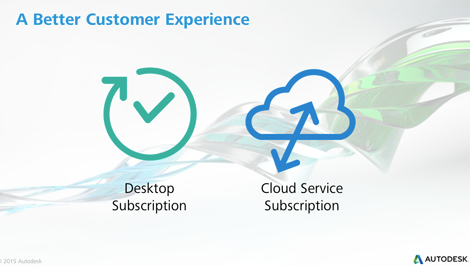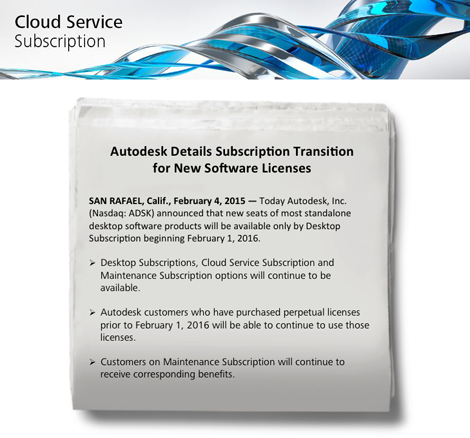
Autodesk has announced changes to the way its licenses will operate in the future
Sales of boxed AutoCAD built a huge network of resellers around the globe and sold millions of copies of perpetually owned software to customers, but today Autodesk is announcing that from 2016, it will no longer be possible to buy perpetual licenses of its individual products
It will, however, still be possible to acquire perpetual licenses of Suites for some time after.
The company has already announced subscription and term licensing and has moved elements of product fulfillment to web delivery and has added services to its offering within the subscription package.

Those who have purchased perpetual licenses
before February 1, 2016 will be able to continue to use them
Autodesk’s business model is embracing the cloud and fundamentally changing the way companies buy and use their CAD tools.
This new move is probably the boldest yet, removing the option of buying and owning individual products, and is the start of moving customers to a pure subscription service.
For Autodesk this is great news as it can cut down on piracy, maintain the price and margins around the world and claw back revenue given to it’s sales infrastructure of dealers and distributors.
It also still has millions of customers that have stuck to three year upgrade cycles. The aim is to bring as many of these customers on board with desktop subscription pricing vs perpetual ownership with maintenance.
While talking to Andrew Anagnost, Sr. VP, industry strategy and marketing at Autodesk, the man behind the company’s evolving model, we were told that desktop subscription with cloud services provided a better customer experience versus shipping just a boxed product.
It was easier to deploy software, simplifies upgrades and offers more flexible access to tools and new workflows. The company is also offering a range of new on-line ‘cloud’ services for collaboration, rendering and analysis.
Autodesk is giving the market a year’s notice to this transition and will offer flexible terms to those who have individual perpetual licenses, such as multi-year subscription deals and no charge for maintenance. The company will also offer additional programs.
Having said that, Autodesk’s cloud offerings and subscription roll out appear to still be embryonic in many places and the company has yet to find the right amount of features when compared with the subscription fee to please the masses. Autodesk is making this transition second only to Adobe in speed in the software industry.
The changes to the dealer and distribution channel will be interesting, as over time many of these have been weaning themselves off boxed product revenue and turned more to training and offering services.
Even if the delivery and route to market may change for Autodesk’s products they will still need support in the field.
This of course, may also push dealers to go sell some competitive CAD system and some customers may seek an alternative design tool.
Let us know what you think of the move below the line.






